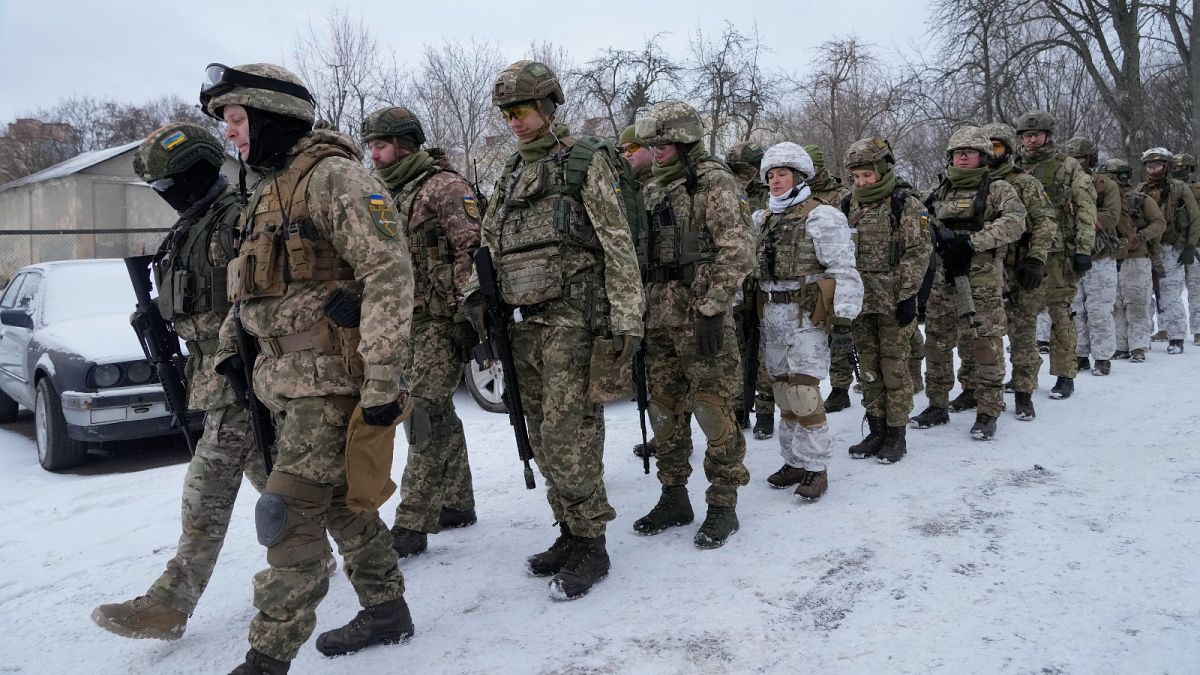The alliance will deploy more ships and fighter jets to reinforce "deterrence and defence," while the EU will provide Ukraine with a new financial assistance package worth €1.2 billion.
Western powers pledged to provide Ukraine with more money and send additional ships and fighter jets to Eastern Europe amid tensions with Russia.
The North Atlantic Treaty Organization (NATO) said that it would deploy more ships and fighter jets to some of its easternmost members, while the European Commission said it would provide Ukraine with a new financial assistance package worth €1.2 billion.
"We are firm in our resolve," EU Commission President Ursula von der Leyen said. "As ever, the EU stands by Ukraine in these difficult circumstances."
The United States and its allies have increasingly warned in recent weeks that Russia could invade Ukraine after the Kremlin 100,000 troops at the two countries' shared border. Russia began building up more troops there in November after a similar move in March 2021.
Amid the fears of a possible invasion, the United Kingdom's foreign office said in a statement on Saturday that they had information indicating Russia was "looking to install a pro-Russian leader in Kyiv as it considers whether to invade and occupy Ukraine."
The foreign office said that Ukrainian MP Yevheniy Murayev was a possible candidate. The Russian foreign ministry dismissed the UK statement as "nonsense."
Russia annexed Crimea from Ukraine in 2014. Around the same time, two regions in eastern Ukraine broke away from government control. A subsequent conflict between Russian-backed separatists and Ukrainian forces has killed more than 13,000 people.
The United States, NATO and EU have called for Russia to de-escalate tensions by drawing down its troops on the Ukrainian border. US Secretary of State Antony Blinken spoke with his Russian counterpart, Sergey Lavrov, in Geneva on Friday, a day after warning of "massive consequences" in the event of any Russian military incursion into Ukraine.
In December, Russia sent a list of demands to the US and its allies, including that NATO did not expand to Ukraine or any other former Soviet countries.
Moscow also insisted that the alliance withdraw forces from some eastern European member states that joined after 1997, including Bulgaria and Romania.
Those demands were dismissed by the US and NATO as nonstarters. Instead, NATO appears to be doubling down on deterrence.
In its statement Monday, NATO said Denmark plans to send a frigate to the Baltic Sea and four F-16 fighter jets to Lithuania, while the Netherlands is sending two F-35 fighter aircraft to Bulgaria in April.
"NATO will continue to take all necessary measures to protect and defend all Allies, including by reinforcing the eastern part of the Alliance," said the alliance's secretary-general Jens Stoltenberg. "We will always respond to any deterioration of our security environment, including through strengthening our collective defence.”
Embassy drawdown discussions
Amid the increased fears that Russia could invade Ukraine, the United States ordered family members of government employees at the country's embassy in Kyiv to leave and the United Kingdom withdrew some embassy staff.
The State Department also authorised the departure of some embassy employees who wish to leave Ukraine.
"We are continuing to pursue the path of diplomacy, but if Russia chooses further escalation, then the security conditions, particularly along Ukraine’s borders in Russia-occupied Crimea, in Russia-controlled eastern Ukraine...can deteriorate with little notice," a senior State Department official told reporters, according to a transcript of the call.
"I just want to be clear that these are prudent precautions that in no way undermine our support for or commitment to Ukraine," the official added later.
The UK foreign office said some embassy staff and their families would be "withdrawn from Kyiv in response to the growing threat from Russia".
"The British embassy remains open and will continue to carry out essential work," a foreign office spokesman said.
Ukraine's foreign affairs ministry called the US decision "premature and a manifestation of excessive caution."
"There have been no radical changes in the security situation recently: the threat of new waves of Russian aggression has remained constant since 2014, and the accumulation of Russian troops near the state border began in April last year," spokesman Oleg Nikolenko said in a statement while urging people to remain calm.
The EU's high representative for foreign affairs Josep Borrell said the EU was not planning on a similar move but were eager to hear the US reasons behind the announcement.
"I don’t think we have to dramatise, as far as the negotiations are going... I don’t think that we have to (leave) Ukraine," he told reporters ahead of a videoconference with Blinken.
Diplomatic talks are expected to continue in the coming days.
Lavrov said on Friday that the US would deliver a written response to the Kremlin's demands this week. Blinken emphasised that the response would include the US government's "many" concerns.
Blinken said he expects the two sides "to meet again after Russia has had an opportunity to look at this paper and then we'll see where we go from there."
